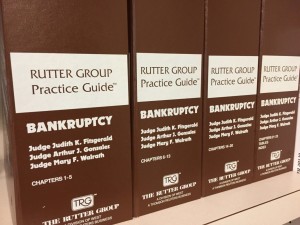Chapter 7 vs. Chapter 11 vs. Chapter 13
 Here’s the answer to the question that everyone wants to know: “Which bankruptcy should I file?”
Here’s the answer to the question that everyone wants to know: “Which bankruptcy should I file?”
Your bankruptcy attorney will actually answer that because you don’t pick a bankruptcy. Instead there is a Chapter bankruptcy that matches your financial situations.
Yes, filing bankruptcy is a choice but the Chapter of bankruptcy you will file is NOT. Choosing to file bankruptcy is a major decision and should be carefully weighed after talking with an extremely knowledgeable bankruptcy attorney.
Before you decide to file bankruptcy, meet with a bankruptcy attorney with the experience to know what’s going to be in your best interest. Then ask yourself whether the debt relief offered through bankruptcy will solve your financial challenges.
Lanigans Meet In-Office for Consultation
Eric Lanigan and Roddy Lanigan suggest that you follow through on an in-person consultation. You can’t get answers to your largest financial concerns over the phone or e-mail. This is a legal issue, a financial issue that affects you, your family and your business–now and in the future. This is not a simple or easy situation. Bankruptcy chapters each have requirements and guidelines based on your income, debt, business debt, and assets.
Yes, you will usually have a choice explained to you by the bankruptcy attorney you hire. Whether it’s between a Chapter 7 or a Chapter 13, or a Chapter 11 will vary on your debt problems.
Which Bankruptcy Will You File?
You don’t actually choose to file Chapter 7 bankruptcy, Chapter 11 Bankruptcy or Chapter 13 bankruptcy. Bankruptcy is decided by your income, your debt, your assets, your financial situation and your goals and is based on Florida bankruptcy law and the Florida Means Test.
An attorney will assess your options, then tell you what your bankruptcy options are, then you’ll decide for yourself. You are 100% legally responsible for being honest and forthright in answering every question a bankruptcy attorney will ask you. You can’t change or alter your income: it is what it is.
There’s a mathematical test formulated under the bankruptcy laws created to prevent the abuse of debt elimination through a Chapter 7 bankruptcy.
Chapter 7 Bankruptcy
- Garnishments stop
- Last 90 days on average
- Unsecured debt eliminated (credit cards, medical)
- Exemptions allow you to keep your home
- Keep your car through exemptions
- Creditors actions are halted
A Chapter 7 bankruptcy eliminates debt, allows for certain home, auto, 401(k) and other exemptions that will use your income, your county to decide if you qualify for a Chapter 7 bankruptcy. Generally, the debt elimination cleans a slate of unsecured debts. You may not include taxes, lawsuit settlements, child support, alimony or Federal student loans.
You’ll find out if you’re able to file Chapter 7 bankruptcy. A Chapter 7 Bankruptcy is a consumer bankruptcy generally used to discharge debts in 90 to 120 days.
Chapter 11 Bankruptcy
- Creditor liens, lawsuits stopped
- Prevents business from shutdown
- Reorganize debts
- All creditor demands reviewed
- Hold onto merchandise, assets
- Creditors held off
A Chapter 11 bankruptcy is filed by businesses in order to save a business from demanding creditors and reorganize debts and prove the business can become profitable again.
A creditor can file a lien against assets, products or merchandise, and by taking it can cause a business to fold. Filing a Chapter 11 bankruptcy can stop all legal actions against you. Yes, you can keep your business running while the bankruptcy and debts and creditors are sorted out. You want to be able to show that when the debt is higher than the revenue and there doesn’t seem to be a way to become financially stable, that you can indeed turn it around when the debt relief is granted.
You can file Chapter 11 bankruptcy and keep your business running. A Chapter 11 bankruptcy is a reorganization bankruptcy where all creditors’ demands are put on hold and then sorted out in an orderly fashion with lesser or sometimes forgiveness of the amount of money owed.
Chapter 13 Bankruptcy
- Allows you to repay creditors lesser amounts on 3 to 5 year plan
- Must pay on time for duration or all deals are off
- Some debt is eliminated
- Home and vehicle exemptions allow you to keep car and home
- Creditor calls and creditor liens and actions stop
- Reorganize and repay taxes, alimony, child support
A Chapter 13 Bankruptcy is an option when you’d like to repay some of what you owe to creditors you owe over a stringent three- to five-year repayment plan. A Chapter 13 bankruptcy may be your option if your income is above the level allowed to file a Chapter 7 bankruptcy.
A Chapter 13 bankruptcy includes a plan that outlines how you will repay your debts and it is not flexible. You must stick to the plan or you will not be allowed to complete the bankruptcy. The document and payment agreements are established in the courts.

